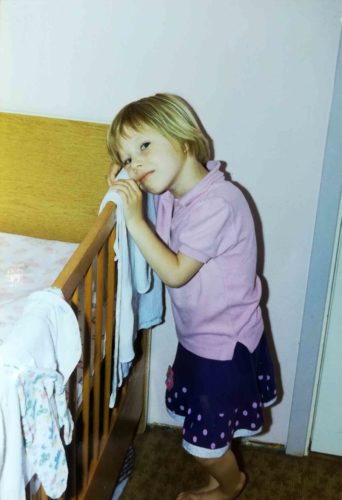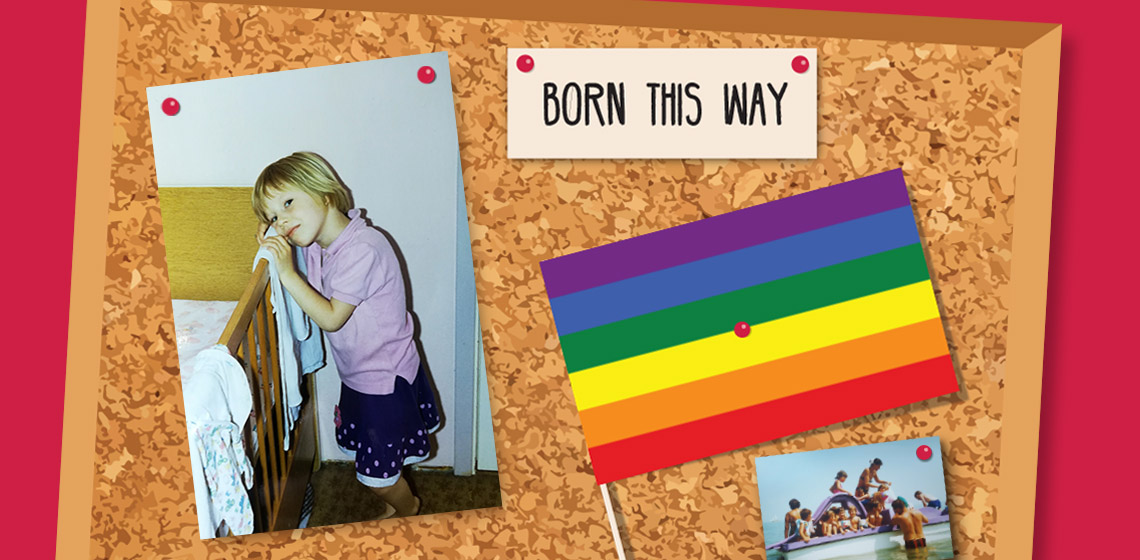The next piece of our Born this way series is by Kinga. Read the others' stories as well and find the series summary HERE.
Our page concept was inspired in LGBTQ+ solidarity by BornThisWayBlog.com
Kinga (5), (1995)

In this picture I’m 5 years old, propped against the bed of my newborn sister. When she grew older and we could play together we loved tacky, whirly skirts. One went on our waists, one on our heads as if we had long hair and we were strutting around in this getup all day. I was a really ‘girly’ girl, I behaved exactly like all the little girls my age so no one noticed me ‘being different’, not even me.
But thinking back about my childhood it’s obvious that I liked girls as much as boys. I enjoyed the company of my girl friends especially as an elementary-schooler, and I pulled them into some surprisingly saucy games.
I was eleven or twelve when I lost the friendship of my best friend, and thinking back of the hysterical, desperate reaction I had, it’s possible that that was my first serious instance of romantic heartache with lasting effects.
I didn’t have a ‘great moment of revelation’ later on either, it was natural for me to be turned on by men as well as women. More precisely, I wasn’t interested in someone’s biological sex if I found their personality attractive. I attended an arts school where I think everyone was more open-minded and accepting, and even though I didn’t openly define myself as bisexual this atmosphere was important for the process of seamlessly accepting myself.
For years I lived with men - in my last relationship, I was convinced I was going to spend the rest of my life with him. I was so invested in this I kept on believing it way after he broke up with me. And I could only get so deeply invested in this relationship if I took my attraction, my thoughts and my desires towards women and locked them up in a tiny closet, no matter how natural they were to me. I was living my little heterosexual life, not knowing that I could define myself as bisexual even if I had no experience with women, that I count as a member of the LGBTQ+ community even if I’m living with a man. If I only knew!
Ignoring something that’s part of you means not being true to yourself. I was full of tension because my self image was off, my knowledge of myself was incomplete.
After the breakup, when I started to piece myself together I felt the need to come out, at 28 years old, to my family, my friends, the colleagues I was close with and the world in general. Mostly because this is how I can be true to myself and find my place in the world. Also I met Nóri and it took me about a week to know that I wanted to hold her hand, that I wanted to kiss her goodbye when we part. I knew that when discussing the weekend programme with my colleagues over a coffee I will not lie. I won’t behave differently just because my partner is a woman. Also if I’m not communicating outwardly that this is natural, I can’t expect others to react the right way either.
Things are not easy right now, because my mother is still waiting for me to ‘come to my senses’, my father prefers not to talk about it and it’s weird for my friends (of course they all love me, but we’re still far away from an acceptable state) … yet I feel more collected than ever.
One last thought for You, who are at the same place as I am, (re)discovering yourselves.
While the acceptance, positive feedback and love of the family, friends and the general environment is vital, the most important thing is to accept yourself. We must be honest, but overhauling your image of yourself, your sense of self is not an easy process. It must not be pressed or forced, you’re allowed to doubt and to experiment (without hurting other people!) and to be curious. We don’t have to label ourselves at once as lesbian, gay or bisexual. You don’t have to live up to any kind of expectation by anyone, sometimes not even your own. Everything will become clear and obvious in time, at its own pace. The most important thing is not to be afraid to love.
Translated by Zsófia Ziaja

